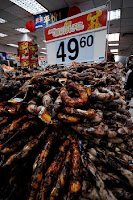As writers, we have probably all experienced negative responses to our work. Heck, not even writers, everyone gets criticisms from time to time. They can be true and helpful -- as the Bible says, "As iron sharpens iron, so one man sharpens another," (Proverbs 27:17) and "Faithful are the wounds of a friend; profuse are the kisses of an enemy." (Proverbs 27:6). Sometimes the criticism is motivated out of jealousy or misanthropy. Sometimes the criticizer is simply not qualified to give a good opinion.
Doesn't matter. IMHO the best way to respond to criticism, no matter what, is to say, "thank you." Period. Don't defend yourself, since you're not going to change someone's opinion anyway. Take the words back with you, and study them. Try to maintain an objective stance (it may take a little time to get there). If the words are pointing out something true, then internalize the message and learn from it. If the words aren't relevant, for whatever reason, then discard them.
This is difficult of course. I have learned that when someone criticizes my manuscript, often what they think is wrong isn't the problem (for example, it may not be a character issue but simply that I'm truncating an emotional scene), but there is SOMETHING there. When more than one person points to the same passage, I scrutinize it with a microscope. I am so grateful for the comments that people have given me to help improve my writing. Even the mean ones can be helpful.
With all this being said, check out this blog review and the comments after it. This just showcases how your defense of your work might appear to others. Wow. Just wow.
http://booksandpals.blogspot.com/2011/03/greek-seaman-jacqueline-howett.html
New Novel - A Middle Grade Mystery
2 weeks ago





















